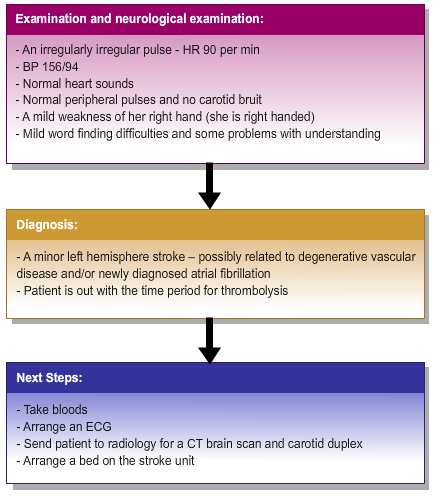
Doctor McGregor reviews the results of Isa’s blood tests:
- Full Blood Count (FBC) = haemoglobin 98g/l (slightly low), Mean Cell Volume 103fl (high), slightly raised white cell count but normal platelet count
- Erythrocyte Sedimentation Rate (ESR) = 56mm/hr (high)
- Urea and Electrolytes (U&E) = normal
- Liver Function Tests (LFT) = normal
- Thyroid function tests = normal
- Blood sugar 9.8mmol/l (high)
- Cholesterol 7.2mmol/l (high) – see Topic Loop below for further information
Topic Loop:
At A&E she is seen by the stroke doctor. He asks Isa and Jean what happened. They describe the sudden onset of speech problems.
He elicits a history of previous angina, raised blood pressure (BP) and late onset diabetes. For further information on diabetes management see Topic Loop below.
She is currently taking the following:
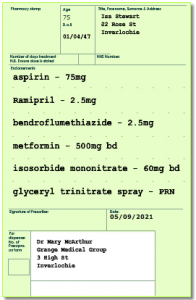
She drinks little alcohol and does not smoke.
Topic Loop:
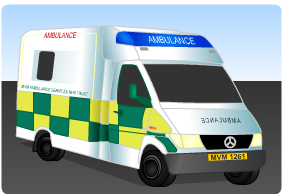
When Jean, a neighbour, visits Isa one afternoon, she notices that Isa’s words are jumbled up. Jean had recently seen the advert for FAST and she dials 999. Whilst waiting for the ambulance she notices some improvement in Isa, but Isa is having difficulty saying some words and is struggling to answer questions.
Since her daughter lives far away, Jean has accompanied her to the hospital.
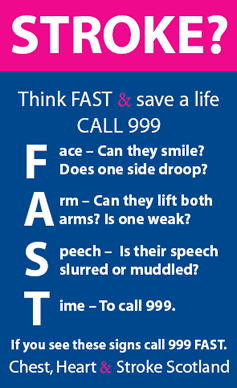
For more detailed information visit FAST Tool: Chest, Heart & Stroke Scotland.
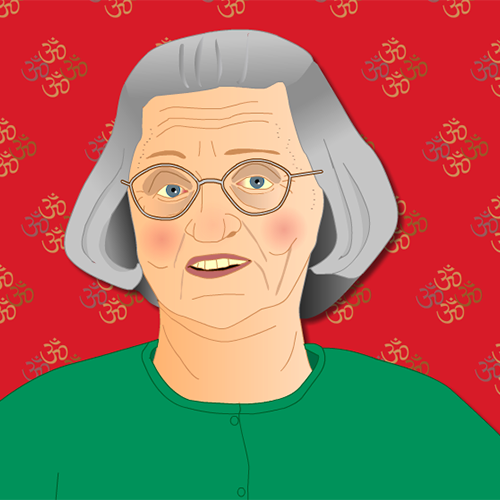
Scenario
Isa is a 83 year old lady. She lives alone since her husband died 3 years ago but she has close friends and family.
Go through the slides to see her isabook and find out more about her social networks.
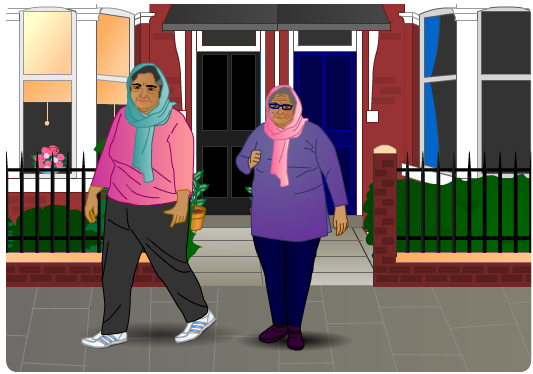
Sheetal is walking regularly with her mother and the group. She takes her medication regularly and has lost some weight. Her doctor is pleased with her blood pressure reading and her cholesterol level. She remains free of further TIA and stroke events.
The Stroke Nurse explains to Sheetal what happens when you have a TIA and what measures will help reduce her risk of stroke.
The following are measures which Sheetal could take to reduce her risk of stroke. Starting at Sheetal’s house select the crosses next to the locations below for more information.
For further information on behaviour change see Topic Loop below.
For more information on self management visit: STARs AM 15 Self Management
Topic Loop:
A week later the specialist stroke nurse goes over the results of the blood tests and other investigations with Sheetal.
Sheetal’s results show:
- Cholesterol = 6.8mmol/l (high)
- Blood sugar = 11.0mmol/l (high)
- Haemoglobin a1c (HbA1c) = 64mmol/mol or >6.5% (indicating her diabetes is poorly controlled)
Sheetal has already been prescribed cholesterol reducing drugs. Her diabetes is currently diet controlled but her blood sugars continue to be high. The nurse suggests the addition of an oral hypoglycaemic agent to improve management. The nurse takes the opportunity to discuss what measures Sheetal can take to alter her lifestyle to reduce her risk of stroke. For further information on diabetes management see Topic Loop below.
Topic Loops:
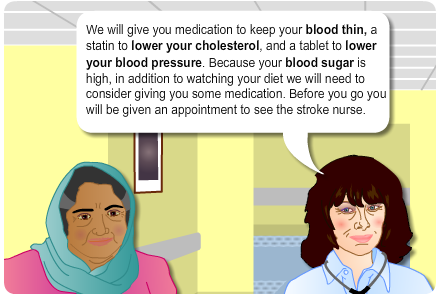
Following the diagram below we know that:
- Sheetal has had a TIA
- No rare causes were identified
- Her ECG showed sinus rhythm
- She is prescribed antiplatelet medication (Clopidogrel 75mg daily)
- She is prescribed cholesterol lowering medication- see Topic Loop below for further information
- She is prescribed an angiotensin converting enzyme (ACE) inhibitor to help lower her blood pressure- see Topic Loop below for further information
- Her diabetic control is being reviewed
- Lifestyle behaviour changes should be used in conjunction with drug therapy to reduce the risk of recurrence
Topic Loops:

